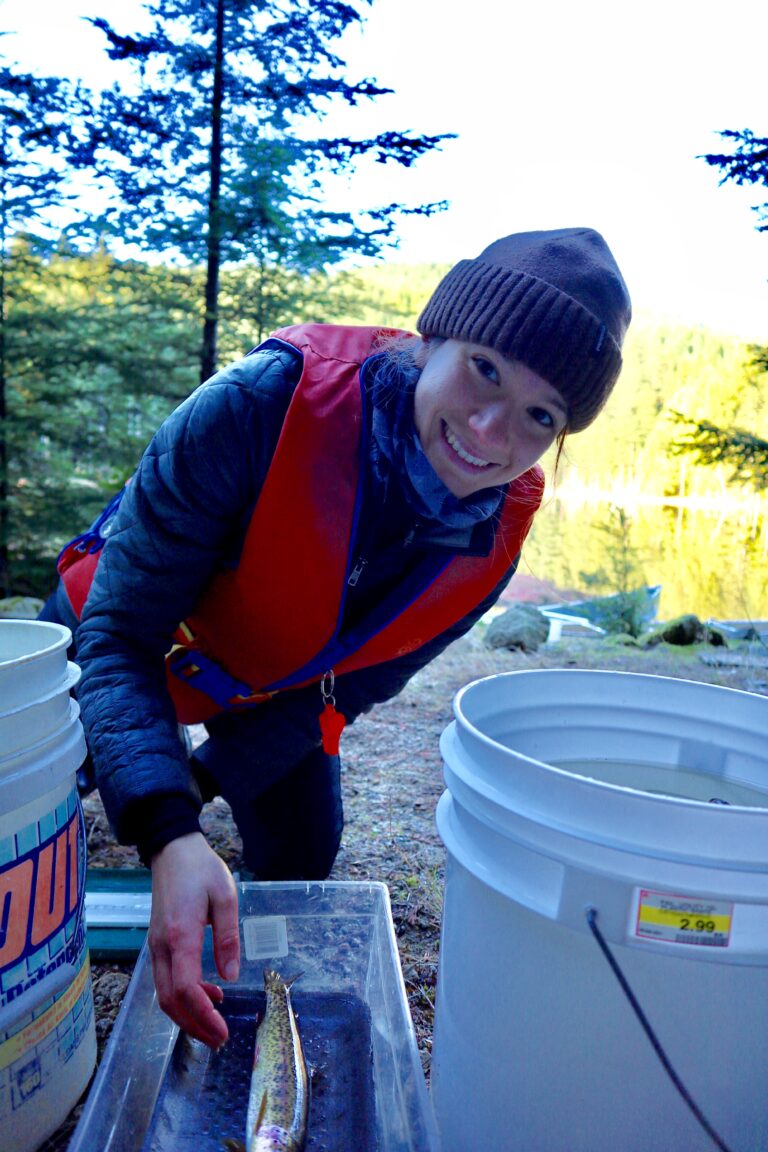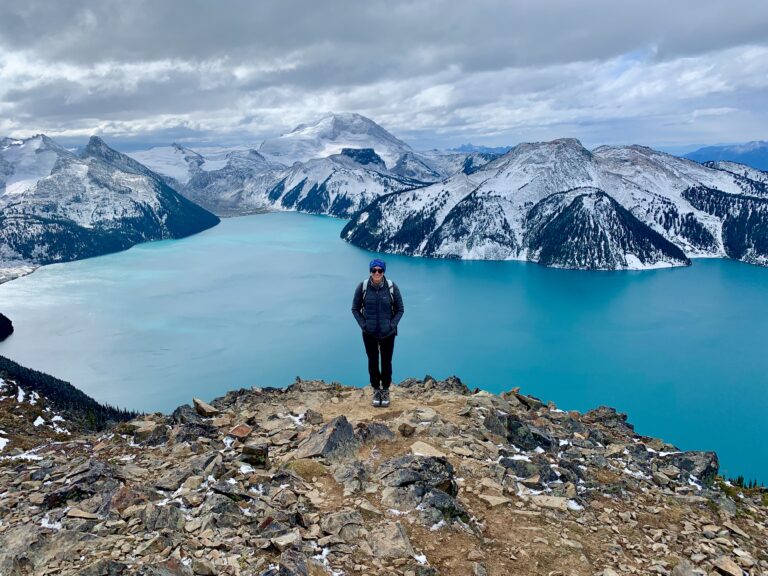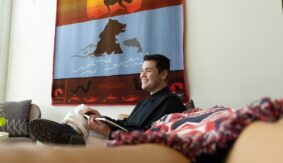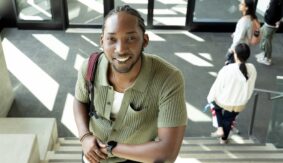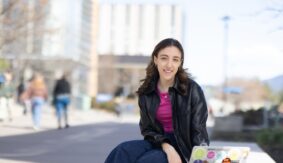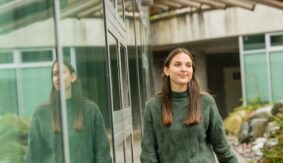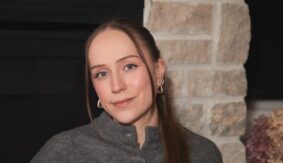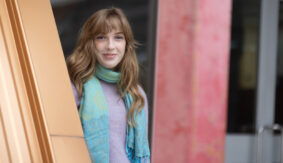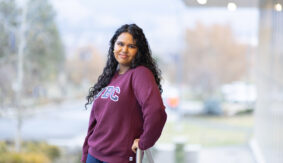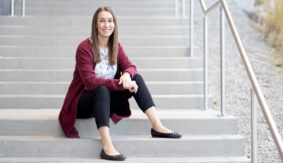
Noa Mayer first came to UBC to study Arts, but changed course after discovering the power of environmental literature.
Reading Rachel Carson’s Silent Spring in class inspired Noa to learn more about sustainability, and she spent her free time researching ways to create a greener future. In her second year, she was determined to focus her studies exclusively on environmentalism, and moved into the Faculty of Forestry. Now concentrating on the conservation of Pacific salmon populations, she is grateful to have gained the scientific skills to make a difference in British Columbia and beyond.
You had an interesting path into Forestry. Can you talk about how you chose the Natural Resources Conservation program?
I originally chose UBC for the Arts One first-year study option, because it had a small program size and an interdisciplinary curriculum of Philosophy, History, and English. I expected to major in English and History, but most of my spare time in my first year was spent learning more about British Columbia’s coastal forests and the conservation concerns we face in Canada.
My journey into Forestry began while we were reading Rachel Carson’s Silent Spring. The book is one of the ignition sources of the environmental social movement in North America and I realized that there were a lot of aspects about the way I chose to live my life that conflicted with a sustainable future. So I began to read more – The Hidden Life of Trees, This Changes Everything, The Meaning of Human Existence, and A Sand County Almanac – but while these books opened my eyes to the importance of conservation and the threat of the climate crisis, they were not enough. I felt that I needed to know more about the science, and I wanted to know what practical solutions could be developed to protect our coastal forests and prevent further decline of Pacific salmon stocks. I had considered transferring into Environmental Science, but then one of my professors suggested the Natural Resources Conservation program, and it had all the information and practical skills I would need to contribute to the field of conservation science.
What’s the best part about the program?
The best part is the Integrated Field School that we take in the second to last semester of our degree. There are two streams in the Natural Resources Conservation program: science and management, and global perspectives. The Integrated Fields School is for students in the science and management stream, and is a 15-credit capstone course that provides invaluable learning experiences. We take week-long trips to various regions in BC to collect data and develop more rigorous fieldwork skills, and then we organize, analyze, and carry out detailed scientific reports on our findings. It was in this field school that I began the transition from student to scientist and strengthened my resolve to continue on with graduate studies and scientific research.
People are sometimes surprised by how scientifically rigorous the Natural Resources Conservation program is at UBC. Can you talk a bit about the scientific elements of the program?
Throughout the program students are taught to select research questions and hypotheses, and develop suitable experimental designs to address these hypotheses. We are tasked with determining the statistical power of our experimental designs, and how to analyze the structure of the data we have collected. We also develop skills in reviewing existing scientific literature and relevant studies to identify what gaps exist, and what further research is necessary to understand the topic as well as explain our own results.
You have lots of interesting experience volunteering with Indigenous communities. Can you talk a bit more about that work?
I spent one year on a youth advisory board for a not-for-profit organization called Waterlution. We developed and implemented a reconciliation program called the Great Canoe Journey in schools across Canada, where students would be able to learn about local Indigenous cultures through traditional canoe building and use. I joined this board after taking two courses at the Haida Gwaii Institute on systems thinking and environmental assessment. During these courses I understood that the information being shared with me by members of the Haida Nation was both a gift and a responsibility. I was no longer as ignorant to the oppression and suffering of First Nations people in Canada and they asked that we take what we learned in these courses on Haida Gwaii and do something with the information.
Even though my time as a board member for Waterlution has ended, I’m now using that knowledge and working with another organization on First Nations-led forest protection initiatives in British Columbia. I also hope to pursue graduate studies in Pacific salmon conservation management and continue to learn from and work in collaboration with Indigenous communities to protect these fish populations, as they are of great cultural importance to many BC First Nations.
My summer job has allowed me to begin to develop practical ideas to solve conservation problems.
You also worked in the forestry industry last summer. How was that experience?
I believe that to create change in forest management, you have to first develop an understanding of how forestry is carried out in practice. I felt that the best way to do this would be to spend some time gaining first-hand experience in timber development and silviculture, and so I worked for a small forest consulting firm in Smithers, BC, for four months. It was incredibly challenging to work 10-hour days but I learned a lot about how the industry is choosing to respond to the devastation from widespread fires and insect outbreaks. I also carried out many forestry stream assessments as mandated by the Ministry of Forests. I still feel that I could spend many more years working in industry and have much more to learn about the intricacies of the forestry sector, but my summer job provided me with insight into the mentality of the industry and has allowed me to begin to develop practical ideas to solve conservation problems.
Do you have any career goals in mind after completing your program?
I’ve spent a large portion of my upper-level years studying watershed hydrology and the impacts of land-use change on fish habitats. Through taking both undergraduate- and graduate-level hydrology courses as well as several aquatic ecology courses, I’ve realized that I want to dedicate my career to fish conservation and management research. I fell in love with BC’s coastal forests and that’s what brought me to the Faculty of Forestry, but those forests’ ecology relies on the Pacific salmon stocks that migrate through the extensive stream networks.
What would you say to prospective students who are considering choosing Natural Resources Conservation, or another program in the Faculty of Forestry?
The Natural Resources Conservation program is great for students looking to develop skills in scientific research and who are looking to dedicate their future careers to species and habitat conservation and management. Being in the Faculty of Forestry is also really beneficial as it is a relatively small faculty where you are well supported, and is full of highly renowned professors who show a great deal of dedication to your learning experience.
What has your UBC experience helped you achieve so far, and how?
My experience at UBC has helped shape my future career path. I have been able to develop extensive research and field skills that I know I will use in whatever opportunities arise once I graduate. On a more personal level, my experience taking courses in forest ecology, wildlife ecology, and aquatic ecology has allowed me to look at the natural world around me through an entirely new lens. I can recognize that there are intricacies in the smallest of ecosystems beyond what modern science has allowed us to learn so far, and that there is so much more to discover.
